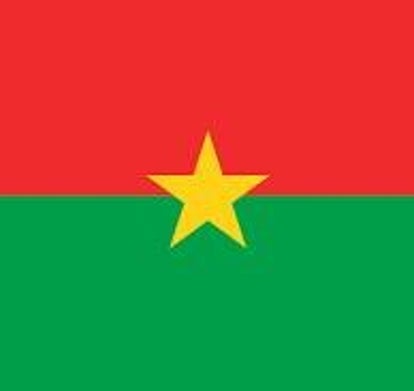The African Union Anthem arranged for String Orchestra.
The African Union (AU) is a continental body consisting of the 55 member states that make up the countries of the African Continent.
The Algerian National Anthem arranged for String Orchestra.
Kassaman", or "Qassaman" romanized: Qasaman, "we pledge", "the oath" or "we swear"), is the national anthem of Algeria. Moufdi Zakaria authored the lyrics, while the music was composed by Egyptian composer Mohamed Fawzi. The song was adopted as the national anthem in 1962, when the country gained independence from France.
An arrangement of the Angolan National Anthem for Brass Quintet.
"Angola Avante" (English: "Onwards Angola", lit. '"Angola onward"') is the national anthem of Angola. Ruy Mingas composed the music, while the lyrics were authored by Manuel Rui.
Botswana National Anthem for Brass Quintet. "Fatshe leno la rona" "Blessed Be This Noble Land" is the national anthem of Botswana. The music was composed by Kgalemang Tumediso Motsete, who also authored the song's Setswana lyrics. It was adopted when the country became independent in 1966.
Beninese National Anthem for Brass Quintet.
"L'Aube nouvelle" ("The Dawn of a New Day") is the national anthem of Benin. Written and composed by Father Gilbert Jean Dagnon, it was adopted upon independence of the Republic of Dahomey from France in 1960.
An arrangement of the African Union Anthem for Brass Quintet. The African Union (AU) is an supranational union consisting of fifty-three African states.
An arrangement of the Algerian National Anthem for Brass Quintet.
Both the lyrics and music were officially adopted in 1962;in that same year, the Évian Accords were signed, paving the way for a referendum in which Algerians overwhelmingly voted in favour of independence, which was duly granted.
The Angolan National Anthem arranged for String Orchestra.
"Angola Avante" was composed by Ruy Mingas. The lyrics to the song were penned by Manuel Rui Alves Monteiro (1941–), an author who studied in Huambo and is affiliated with both the country's Writer Union and Union of Artists and Composers.
An arrangement of the Botswana National Anthem for String Orchestra. The anthem is normally sung in four part vocal harmony. It is performed at events, both at tribal and at national level. For instance, it is sung before traditional village meetings
Beninese National Anthem for String Orchestra. After Dahomey became the People's Republic of Benin in 1975, the anthem was retained, but the words Dahomey and Dahoméen were changed to Bénin and Béninois.
Burundian National Anthem for Brass Quintet. "Burundi Bwacu" "Our Burundi") is the national anthem of Burundi.
Burkino Faso National Anthem arranged for Brass Quintet.
Also called “Une Seule Nuit” (One Single Night), Burkina Faso’s anthem, entitled “Le Ditanye” according to the constitution, was adopted when the country changed its name from Upper Volta to Burkina Faso in 1984.
Written in the Kirundi language by a group of writers led by Jean-Baptiste Ntahokaja, a Catholic priest, and composed by Marc Barengayabo.
Burkino Faso's National Anthem for arranged for String Orchestra, written probably by Thomas Sankara the President and Guitarist.
How did the practice of national anthems get started?
The first countries to adopt national anthems were the European monarchies, in the late 18th century. (Probably the earliest of those was Great Britian.) It was probably started as a means of praise to the ruler. The tradition quickly spread across Europe as other countries saw the advantages of such a song. Other countries with republican types of government (such as France) developed anthems from songs that were de facto anthems, songs used as rallying cries of the people. People-groups and regions developed their anthems in much the same way. However a particular nation came about with their national anthem, the practice spread to other parts of the globe during the late 19th century, when Europeans were colonizing other countries and bringing in their ways. Until the early twentieth century, “national anthems” as we know them were rare (indeed there was not the need for them that we have, no television or radio to broadcast them, no Olympics to play a winner’s anthem, etc.) Therefore, keep in mind that most of the anthems on this site before roughly 1930 were probably unofficial. Also, note that many of the leading countries of today didn’t officially adopt an anthem until well into the twentieth century (United States (1931), Germany (1922), Canada (1980)), and some (like the United Kingdom and Finland) never officially adopted an anthem, their anthems in current use have been “de facto” legitimized through popular use.
One of the best quotes on the subject can be found from Thomas O’Higgins, a legislator from Ireland. Speaking on the national anthem in 1933, he said: “National Anthems come about, not because of the suitability of the particular words or notes, but because they are adopted generally by the nation. That is exactly how the “Soldier’s Song” became a National Anthem in this country. It happened to be the Anthem on the lips of the people when they came into their own and when the outsiders evacuated the country and left the insiders here to make the best or the worst of the country. It was adopted by the people here before ever it was adopted by the Executive Council”.













